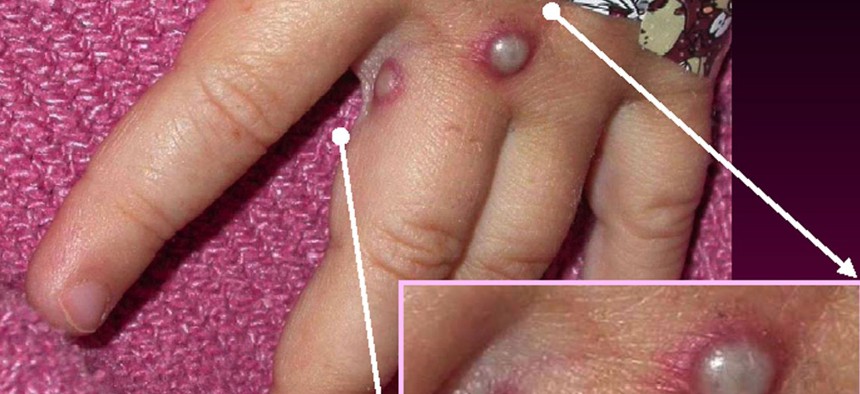The Federal Response to Monkeypox: Empathy, Equity, Science and Transparency

A Centers for Disease Control and Prevention handout graphic shows symptoms of the monkeypox virus on a patient’s hand on May 27, 2003. CDC Handout/Getty Images
Mitigating the virus comes down to “testing, tracing and timely vaccines and treatments,” a senior health official says.
Federal officials are working to mitigate and contain monkeypox as the case count has risen domestically and globally after an outbreak started last month.
There are currently over 700 cases of monkeypox globally and 20 in the United States (and one more who was “infected and tested elsewhere,” said an official) between 11 states, as of Friday. There haven’t been any deaths yet and the strain of the virus is the less severe one, but federal officials along with local partners are still increasing their efforts to contain the virus through testing, contact-tracing and treatment options.
“As part of our response, [the Centers for Disease Control and Prevention] developed a public health and clinical recommendations guidance and released testing guidance to laboratories,” Capt. Jennifer McQuiston, deputy director in the division of High Consequence Pathogens and Pathology at the CDC, said during a briefing on Friday. “CDC has developed protocols for the use of vaccines and antivirals to treat and prevent monkeypox.” She added that more information can be found in the CDC’s “Morbidity and Mortality Weekly Report” on monkeypox released on Friday and on the agency’s website.
Currently, the cases in the United States are mostly among those who have traveled recently and identify as gay, bisexual or other men who have sex with men.
“So, in addition to the broad outreach efforts, we’re also focusing efforts to raise awareness within the LGBTQ+ community,” McQuiston said.
Mitigating the virus comes down to “testing, tracing and timely vaccines and treatments,” said Raj Panjabi, senior director for global health security and biodefense at the White House.
He said the Biden administration's response to this outbreak is being guided by empathy, equity, science and transparency.
So far, over 120 PCR (polymerase chain reaction) tests have been performed across the country and there are 67 labs across 46 states that can collectively do over 1,000 tests per day, said Panjabi.
During a briefing on May 23, federal public health officials discussed the vaccine and treatment options for monkeypox, which included approximately how many of each vaccine option was in the strategic national stockpile.
However, during the call on Friday officials said they could not discuss the numbers for security reasons and McQuiston said the vaccine availability has “shifted” and previous numbers are not accurate. Yet, the officials said there are plenty of vaccines available for those who need them.
So far, 1,200 vaccines and 100 treatment courses have been delivered to eight jurisdictions, said Panjabi.
One vaccine option, Jynneos, is a two-dose regimen, and the other ACAM2000, is “an older-generation smallpox vaccine that has some potential significant side effects with it, so, a decision to use that widely would have to have some serious discussion behind it,” McQuiston said on the May call.
To date, just one state has requested ACAM2000, which state officials, along with medical experts, decided was the best treatment, said Dawn O'Connell, assistant secretary for preparedness and response in the Health and Human Services Department.
Monkeypox was first discovered in 1958 and the first human case was detected in 1970 in the Democratic Republic of the Congo. While monkeypox cases have predominantly been detected in West and Central Africa countries it has not been unheard of for cases to originate elsewhere.
The United States had its first-ever outbreak of monkeypox in 2003, which was linked to infected pet prairie dogs. There were 47 confirmed and probable cases. Over the past five years there has been a re-emergence of monkeypox in Nigeria, which has led to at least eight known cases of it internationally.
The countries with current monkeypox cases are not endemic for the monkeypox virus, World Health Organization Director-General Tedros Adhanom Ghebreyesus said earlier this week.
“Investigations are ongoing,” he said. “But the sudden appearance of monkeypox in many countries at the same time suggests there may have been undetected transmission for some time.”
NEXT STORY: Teresa Carlson returns to Microsoft






